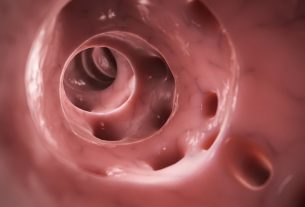Leptin is a hormone that participates in the regulation of hunger and metabolism, and that stimulates energy expenditure, promoting a reduction in food intake and thus favoring the maintenance of adequate weight.
When the body has many fat cells, as in the case of being overweight, leptin levels in the body can become high, which temporarily reduces hunger and food intake.
However, over time, high and constant levels of leptin cause resistance in the body and the brain stops responding to the action of this hormone, stimulating constant hunger, reducing energy expenditure and thus promoting the gain of Weight.

Main functions of leptin
Leptin is a hormone released by fat cells and has the following functions:
- Control your appetite, decreasing food intake;
- Regulate metabolism, promoting the maintenance of body weight;
- Stimulate energy expenditure, promoting weight loss;
- Regulate blood glucose levels, because it decreases glucose production in the liver.
Furthermore, it is believed that leptin is also involved in modulating the immune system, as this hormone activates defense cells that fight inflammation.
Relationship between leptin and weight loss
Leptin has been referred to as the weight loss hormone, because, when it is at adequate levels in the body, it acts in the brain to reduce hunger, regulate metabolism and stimulate the burning of body fat.
However, in the exaggerated production of this hormone, as happens in leptin resistance, the brain no longer acts on leptin stimulation to regulate satiety, increasing hunger and making it difficult to lose weight or favoring weight gain.
Difference between leptin and ghrelin
Ghrelin is a hormone produced by the stomach and intestine, and is responsible for stimulating the feeling of hunger in the brain. Ghrelin is increased mainly during fasting. Furthermore, ghrelin also has the highest levels in cases of malnutrition such as anorexia nervosa and cachexia, for example. Learn more about ghrelin.
Leptin is a hormone produced by fat cells that acts in the brain, controlling appetite and metabolism, and stimulating energy expenditure. Leptin can be high especially in people with excess fat cells, as occurs in obesity.
Normal leptin values
Normal leptin values vary depending on the person’s gender, body mass index and age:
- Children and young people aged 5 to 9: 0.6 to 16.8 ng/mL;
- Children and young people aged 10 to 13: 1.4 to 16.5 ng/mL;
- Children and young people aged 14 to 17: 0.6 to 24.9 ng/mL;
- Women with a BMI of 18 to 25: 4.7 to 23.7 ng/mL;
- Women with a BMI greater than 30: 8.0 to 38.9 ng/mL;
- Men with a BMI of 18 to 25: 0.3 to 13.4 ng/mL;
- Men with a BMI greater than 30: 1,8 a 19,9 ng/mL.
Leptin values can also vary according to health status and may be increased due to the influence of inflammatory substances or hormones such as insulin or cortisol, for example.
Other factors can reduce leptin levels in the body, such as weight loss, prolonged fasting or smoking, for example.
How to assess leptin levels
Leptin levels are assessed through a blood test, which must be ordered by a doctor.
To take the leptin test, you must fast for 12 hours, however, some laboratories request only 4 hours of fasting. Therefore, you should always check with your doctor and laboratory for preparation recommendations before taking this exam.
What does it mean to have high leptin?
High leptin, also known as hyperleptinemia, generally occurs in cases of excess weight, as excess fat cells stimulate high production of this hormone.
Thus, the brain stops acting on leptin stimulation to regulate satiety. This situation is known as leptin resistance, which causes increased hunger and reduced body fat burning, making it difficult to lose weight or favoring weight gain.
What to do when leptin is high
Some ways to regulate high leptin levels and avoid resistance to this hormone, contributing to weight loss are:
1. Lose weight slowly
In sudden weight loss, leptin levels also decrease quickly and the brain understands that the body is going through a phase of food restriction, thus stimulating the appetite and making it difficult to maintain weight.
Thus, when losing weight slowly, leptin levels also gradually decrease, helping to control hunger and maintain the weight achieved.
2. Avoid inflammatory foods
Some inflammatory foods, such as those rich in sugar, such as sweets, soft drinks, cakes and ice cream; and rich in fat, such as French fries, fast-food meals, sausages and sausages, cause inflammation in cells, which may promote leptin resistance.
3. Maintain a healthy and varied diet
Maintaining a healthy and varied diet and consuming the appropriate amount of calories helps with weight loss or healthy weight loss, avoiding excess body fat and leptin resistance. See how to eat a healthy diet.
To find out how many calories you should consume per day, enter your data into the calculator below:
4. Do physical activity
Doing physical activity regularly helps with weight maintenance or loss, thus balancing leptin levels and regulating hunger and metabolism. Some activities that can help balance leptin levels are running, walking, weight training and HIIT.
Before starting physical activity, it is important to consult a doctor, and it is recommended to receive support from a physical educator, to avoid the risk of injury.
5. Get a good night’s sleep
Getting too little sleep can reduce leptin levels in the body, causing an increase in appetite. Additionally, sleeping less than 7 hours a night can also increase levels of the hormone cortisol in the blood, slowing metabolism and making weight loss difficult.
See in the following video how leptin can be regulated during sleep to lose weight:
6. Medicines
Some medications are being studied for the treatment of insulin resistance. However, there are still no studies that prove the effectiveness of current medications to treat this condition.

Sign up for our newsletter and stay up to date with exclusive news
that can transform your routine!
Warning: Undefined array key "title" in /home/storelat/public_html/wp-content/plugins/link-whisper-premium/templates/frontend/related-posts.php on line 12
Warning: Undefined array key "title_tag" in /home/storelat/public_html/wp-content/plugins/link-whisper-premium/templates/frontend/related-posts.php on line 13



